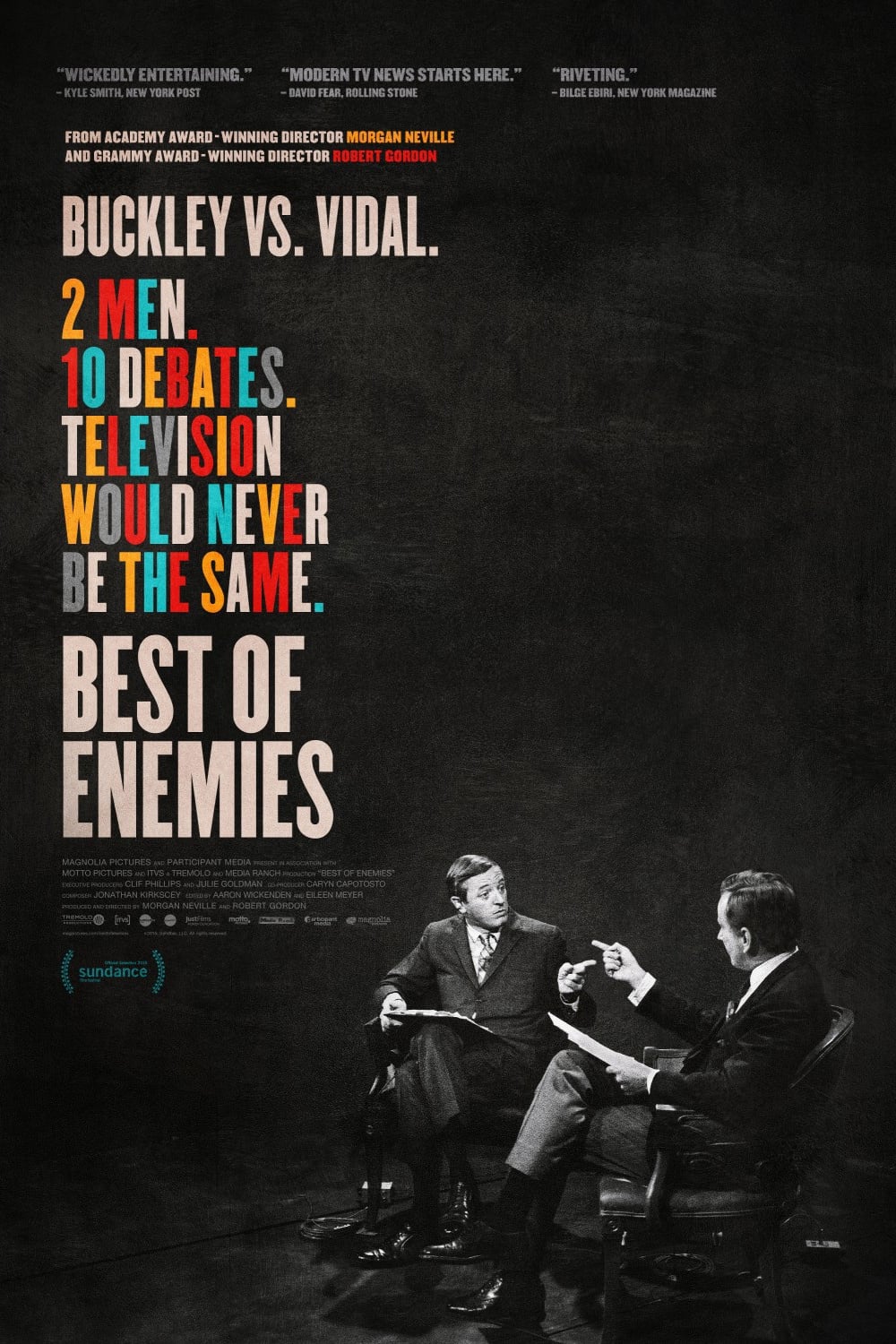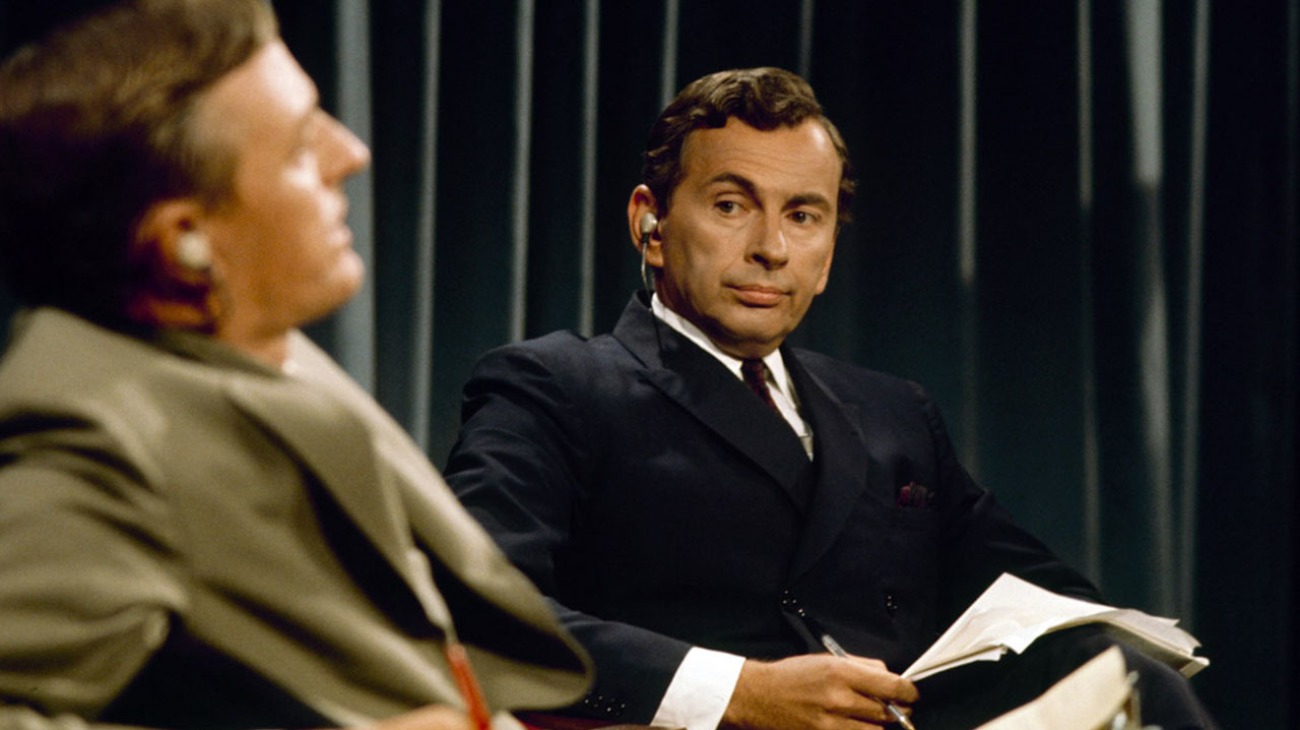
A review in brief
There is no way to make a film in which most of the words spoken come from the velvety-acidic tongues of National Review founder William F. Buckley and novelist Gore Vidal (or actors Kelsey Grammar and John Lithgow reading from Buckley's and Vidal's writing, respectively - inspired casting) and have it be any less than an utter delight. Lo and behold, Best of Enemies is an utter delight.
The documentary, directed by crowd-pleasing expert Morgan Neville (of 20 Feet from Stardom) and Robert Gordon, is a fairly straightforward recap of the ten debates between the ultra-conservative Buckley and the far-left Vidal aired on ABC in 1968, as part of that network's conceptually radical, cost-cutting coverage of the Republican and Democratic National Conventions in that summer. The audience seems to be two kinds of people: political junkies who weren't old enough, or alive at all, to have watched those debates when they were new, and nostalgists who haven't thought about the debates in nearly half of a century; its goal is primarily to entertain its audience by presenting a chewy compendium of the snittiest sound bites delivered by the two utterly patrician commentators, leading up to Buckley's expletive-laced outburst at Vidal on one of the last nights, a conflict that both men would regard as a defining moment for the rest of their lives: one Vidal bragged about, one that Buckley would shut down rather than confront till his final days.
Buckley and Vidal were a marvelous matched pair of classy-as-shit white men who radiated snobbish self-regard and educational superiority; they're the sort of individuals for whom you can agree with every word of their politics (not both of them, obviously, one or the other) and still regard them as just awful, awful people, and still be completely entranced by their magnificent ability to craft language: now as a stiletto to jab the other fella in the neck, now as a warm blanket to smother him to death as he bleeds out. There is not, I concede, anything noble in enjoying the way that Best of Enemies provides a capsule of these men bickering at each other with the verbal equivalent of nuclear weapons, ostensibly about the state of politics in the tenuous year of 1968, but most about how much they hate each other; it's just Over-Literate Terrible People porn, like an Oscar Wilde play. But damn, is it ever pleasurable if that's your flavor of catty bitching.
Neville and Gordon, for obviously very important and intellectually solid reasons, feel the need to make this in any way nourishing, and that is where Best of Enemies shoots itself in the foot. It's one thing to trot out blandly-shot talking heads to contextualise the debates, whether in the form of acquaintances of the two principals, or of media historians explaining what a big damn deal this was in '68. That's probably necessary, even if we tend to hear the same things over and over again, especially about Buckley. Things go completely off the rail when the filmmakers try to mount any kind of political argument. The idea that the Buckley/Vidal debates have informed the current model of confrontational argument with no real intelligence behind it that is more or less our entire way of talking about politics in the United States overreaches in trying to diagnose a very real modern problem through a very narrow lens; meanwhile, the film tries much too hard to sell the idea that these debates were as much a matter of competing ideologies as competing egos. Buckley might arguably be identified as an avatar of the conservative movement, but the same really can't be said at all for Vidal's liberalism, and both of them were clearly driven by arrogant intellectual one-upsmanship in these debates, not a quest to espouse social or political truths. I enormously enjoyed the movie, but its insistence on its own intellectual weight isn't convincing or necessary, and it tends to rob of the film of its energy.
The documentary, directed by crowd-pleasing expert Morgan Neville (of 20 Feet from Stardom) and Robert Gordon, is a fairly straightforward recap of the ten debates between the ultra-conservative Buckley and the far-left Vidal aired on ABC in 1968, as part of that network's conceptually radical, cost-cutting coverage of the Republican and Democratic National Conventions in that summer. The audience seems to be two kinds of people: political junkies who weren't old enough, or alive at all, to have watched those debates when they were new, and nostalgists who haven't thought about the debates in nearly half of a century; its goal is primarily to entertain its audience by presenting a chewy compendium of the snittiest sound bites delivered by the two utterly patrician commentators, leading up to Buckley's expletive-laced outburst at Vidal on one of the last nights, a conflict that both men would regard as a defining moment for the rest of their lives: one Vidal bragged about, one that Buckley would shut down rather than confront till his final days.
Buckley and Vidal were a marvelous matched pair of classy-as-shit white men who radiated snobbish self-regard and educational superiority; they're the sort of individuals for whom you can agree with every word of their politics (not both of them, obviously, one or the other) and still regard them as just awful, awful people, and still be completely entranced by their magnificent ability to craft language: now as a stiletto to jab the other fella in the neck, now as a warm blanket to smother him to death as he bleeds out. There is not, I concede, anything noble in enjoying the way that Best of Enemies provides a capsule of these men bickering at each other with the verbal equivalent of nuclear weapons, ostensibly about the state of politics in the tenuous year of 1968, but most about how much they hate each other; it's just Over-Literate Terrible People porn, like an Oscar Wilde play. But damn, is it ever pleasurable if that's your flavor of catty bitching.
Neville and Gordon, for obviously very important and intellectually solid reasons, feel the need to make this in any way nourishing, and that is where Best of Enemies shoots itself in the foot. It's one thing to trot out blandly-shot talking heads to contextualise the debates, whether in the form of acquaintances of the two principals, or of media historians explaining what a big damn deal this was in '68. That's probably necessary, even if we tend to hear the same things over and over again, especially about Buckley. Things go completely off the rail when the filmmakers try to mount any kind of political argument. The idea that the Buckley/Vidal debates have informed the current model of confrontational argument with no real intelligence behind it that is more or less our entire way of talking about politics in the United States overreaches in trying to diagnose a very real modern problem through a very narrow lens; meanwhile, the film tries much too hard to sell the idea that these debates were as much a matter of competing ideologies as competing egos. Buckley might arguably be identified as an avatar of the conservative movement, but the same really can't be said at all for Vidal's liberalism, and both of them were clearly driven by arrogant intellectual one-upsmanship in these debates, not a quest to espouse social or political truths. I enormously enjoyed the movie, but its insistence on its own intellectual weight isn't convincing or necessary, and it tends to rob of the film of its energy.






